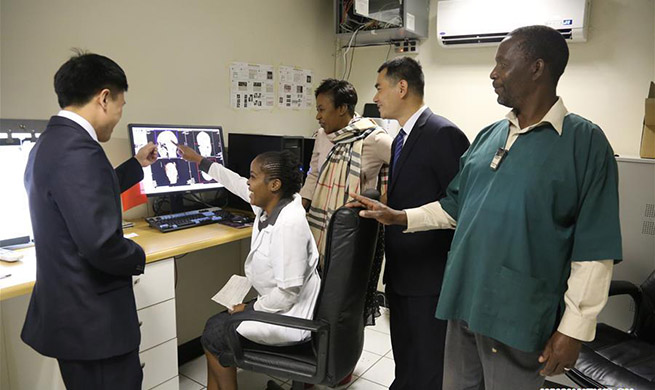NAIROBI, Aug. 19 (Xinhua) -- Kenya's Faith Nyokabi, 25 years old, was last month charged with child neglect after refusing to breastfeed her four months old toddler.
The young mother had earlier demanded 100 U.S. dollars from her husband to breast feed the toddler and backed out when her extortionate scheme failed to materialize.
However, Nyokabi denied the allegations and was released on a cash bail of 30 dollars pending the mentioning of her case in the middle of August.
Nyokabi, just like many other young women in urban settings, are more than often reluctant to breastfeed their babies for a number of reasons.
Among the reasons cited by the young mothers are - fear of losing income which they say is occasioned by inadequate maternity and paternity leave legislation and other workplace policies that support a woman's ability to breastfeed when she returns to work.
Another reason is that of caregiver and societal beliefs favoring mixed feeding. This for instance believes an infant needs additional liquids or solids before six months because breast milk alone is not adequate.
However, many of these women are oblivious to dangers they are putting themselves into.
According to Geoffrey Mutuma, a Kenyan Cancer Specialist and founder of Nairobi Cancer Registry, failing to breastfeed totally or for less than six months are risk factors for breast, ovarian and uterine cancers among women.
Mutuma told Xinhua that breastfeeding reduces the risk of breast cancer primarily through two mechanisms: one way is that the human milk scientifically known as hamlet induces the death of tumor cells active in the breasts.
He added that clinical research has proven that the complex components of human milk secretion lowers the risk of breast cancer in women who breastfeed their babies exclusively for a certain period of time.
As a result, hamlet provides safe and effective protection against the development of breast cancer. Breastfeeding also offers protection against ovarian cancer, rheumatoid arthritis and type two diabetes.
Another way in which breastfeeding reduces chances of getting cancer is because of the differentiation of breast tissues and reduction of lifetime number of ovulatory cycles.
"I would urge women especially the working mothers to breast feed exclusively for at least six months. This will not only be beneficial to the baby but also to the mother as it lowers to the chances of getting breast cancer," said Mutuma.
Experts contend that exclusive breastfeeding is the cornerstone of child survival and child health because it provides essential, irreplaceable nutrition for a child's growth and development.
It serves as a child's first immunization - providing protection from respiratory infections, diarrhea disease, and other potentially life-threatening ailments.
Globally, only 38 percent of infants aged 0 to 6 months are exclusively breastfed.
Recent analyses indicate that suboptimal breastfeeding practices, including non-exclusive breastfeeding, contribute to 11.6 percent of mortality in children under 5 years of age.
Gladys Mugambi, Deputy Head of Nutrition and Dietetics in Kenya's Ministry of Health, revealed that the country has made significant strides in doubling the number of babies being exclusively breastfed from 32 percent in 2008 to the current 61 percent.
Mugambi noted that more needs to be done to ensure that all babies take nothing but breast milk for the first six months of their lives.
She said women tend to discontinue exclusive breastfeeding at four months, around the time they have returned to work after a 90-day maternity leave.
In addressing this challenges, the government amended Health Act to include a clause which stipulates that every organization with more than 30 employees must have a lactation station for mothers.
Mutuma said breast cancer is the second leading cause of cancer deaths among women.
"Another cause of cancer is the use of hormonal-based contraceptives. The combined pill which contains the female sex hormones estrogen and progestogen prevent pregnancy by stopping the ovaries releasing eggs (called ovulation)," said Mutuma.
"However, these hormones can increase the growth of some breast cancers which might explain why taking the pill slightly increases the risk of breast cancer.
In every nine women in Kenya, one will have breast cancer. Hormonal changes are the major cause of different cases affecting woman. I would urge every woman in the child bearing age to go for cancer screening and vaccination," he added.













